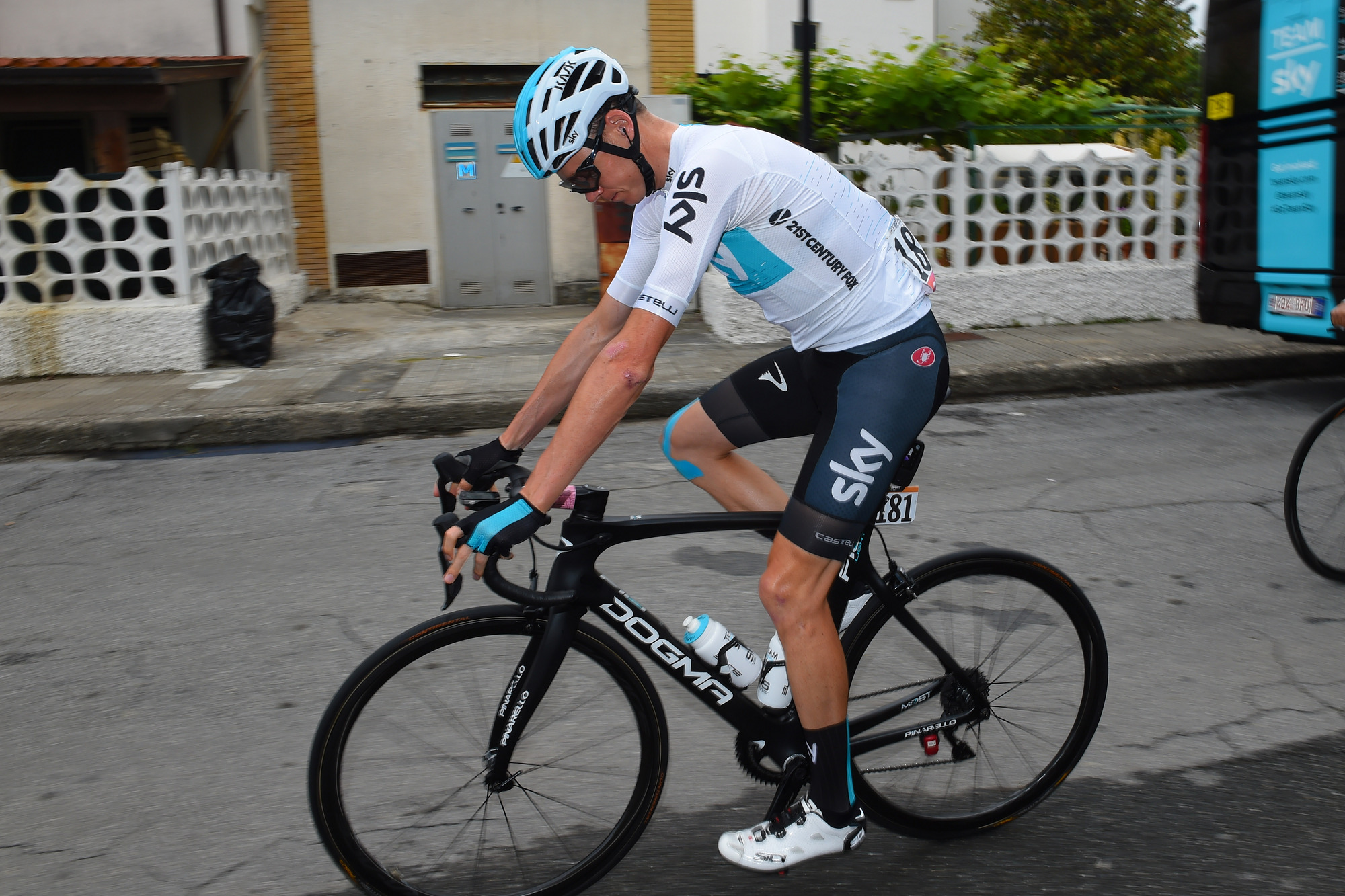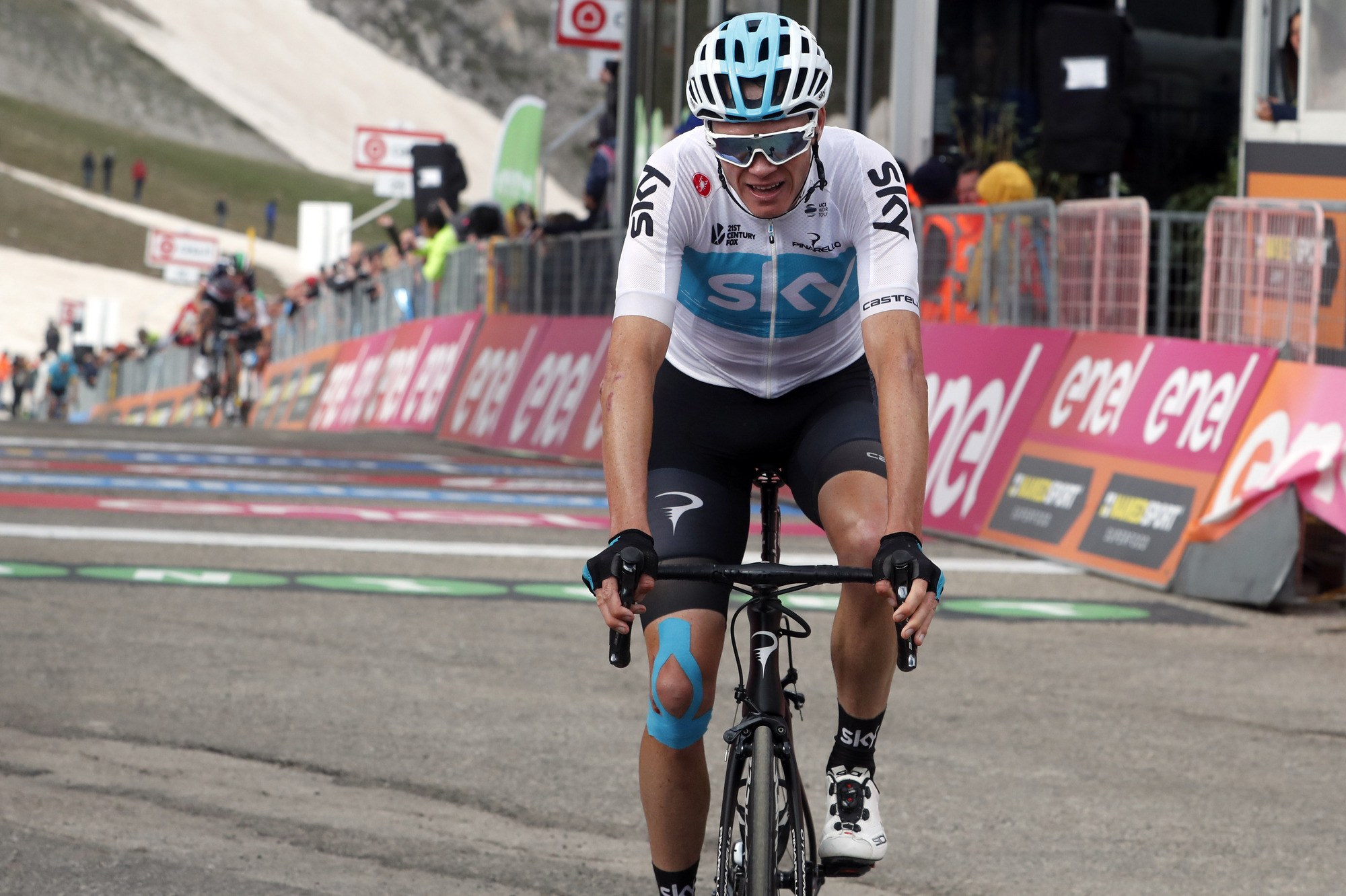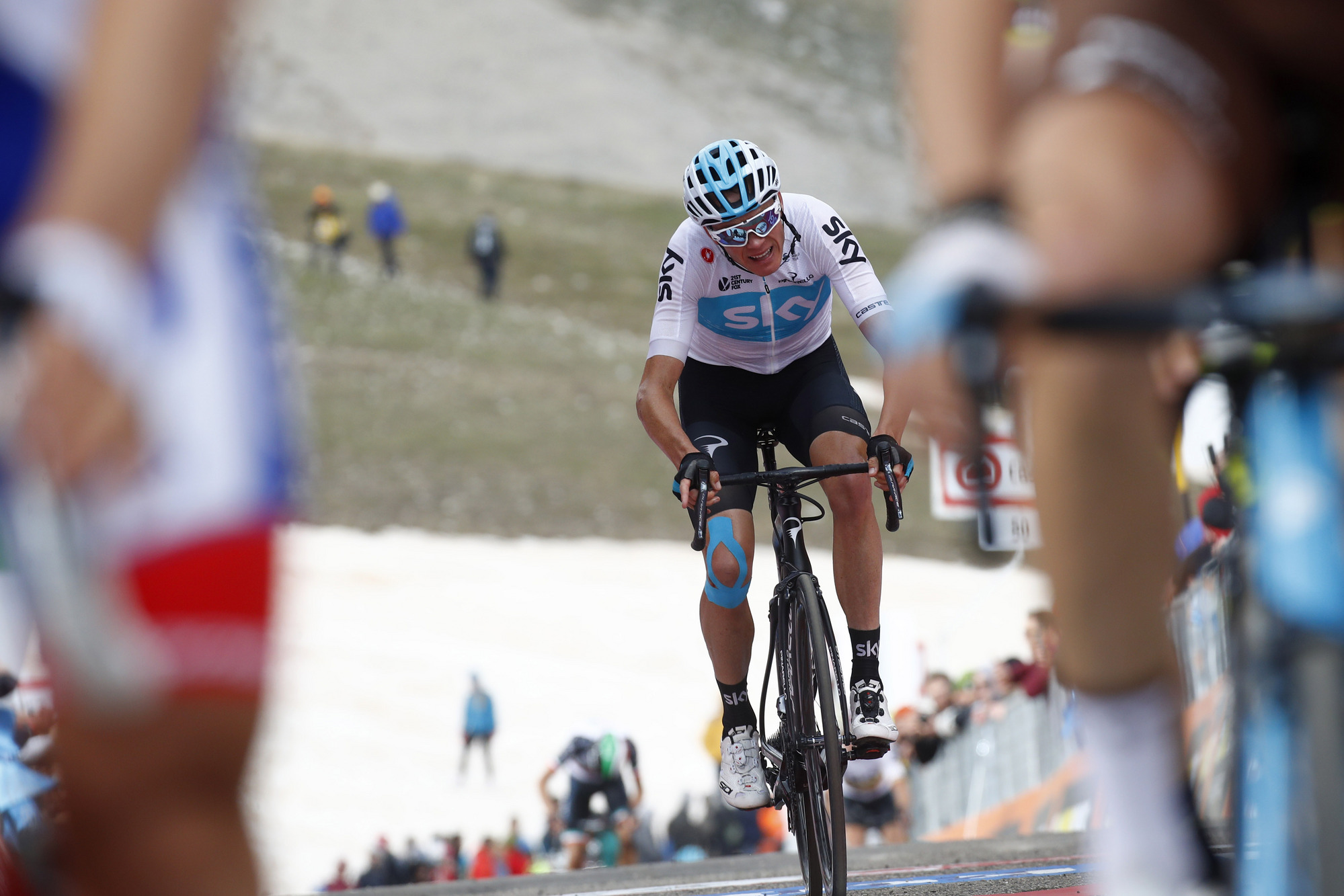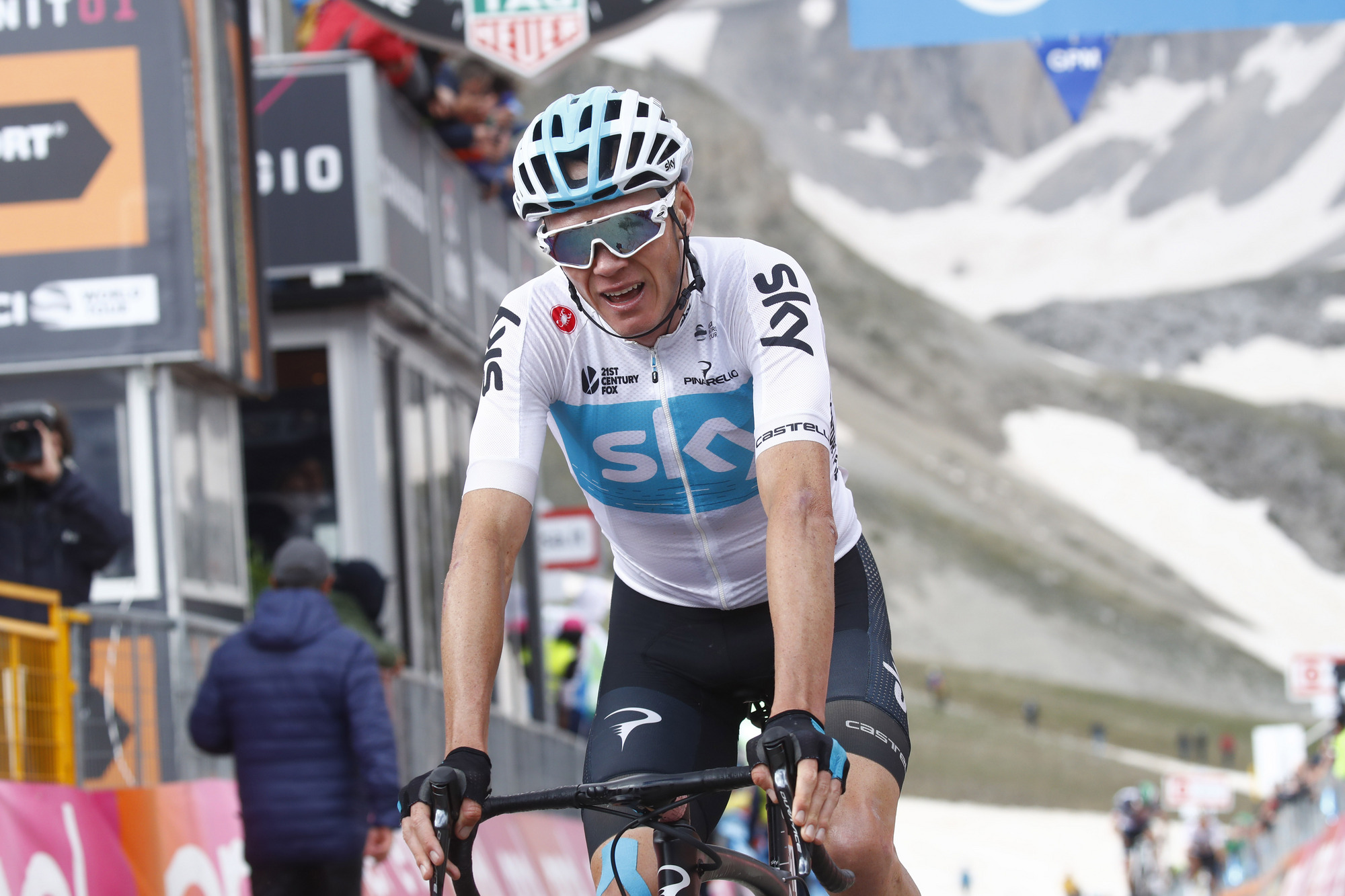Chris Froome: If you have a bad day, that's what happens at the Giro d'Italia
Briton loses another minute at Gran Sasso d'Italia




The final 50 kilometres of stage 9 to Gran Sasso d'Italia were much like Chris Froome's Giro d'Italia thus far, pretty much uphill all the way. Not long after the road began to climb on the penultimate ascent to Calascio, the Team Sky rider was already betraying signs that something was awry.
It can be unwise to read too much into Froome's body language on the bike, given that his grandest statements in the mountains have typically been punctuated by the straining of every sinew. Even so, Froome's pallor and repeated shifting in the saddle suggested that he might be vulnerable come the tough final haul to Gran Sasso d'Italia.
So it proved. Froome was distanced by the pink jersey group on the cusp of the final two kilometres, and seemed to climb in instalments thereafter. He crossed the finish line in 22nd place on the stage, 1:07 down on stage winner Simon Yates (Mitchelton-Scott). In the overall standings, he drops to 11th place, some 2:27 behind Yates.
"I was having a tough, tough day," Froome said afterwards. "I've definitely had a rough start to this Giro. So today I was just trying to hang on as best I could, make it to the rest day tomorrow and then reevaluate the position from there."
Froome's discomfort had visibly amplified in the last five kilometres or so, where the gradient stiffened considerably, and the backdrop shifted with it. As the road rose above 2,000 metres for the first time on this Giro, snow banked the roadsides, and Froome began to slip to the back of the reduced pink jersey group.
A shade over two kilometres from the summit, as Mitchelton-Scott's Jack Haig set a brisk tempo on the front, Froome drifted off the rear of the group. His teammate Sergio Henao slowed to try to help pace him back up, but there was nothing to be done. Accelerations from Thibaut Pinot (Groupama-FDJ) and Domenico Pozzovivo (Bahrain-Merida) dragged the favourites out of sight.
While Yates was sprinting to an emphatic stage victory, Froome's pedalling was slowing almost to a standstill as he navigated the final kilometre. Wout Poels, dropped earlier on the climb, caught his leader and tried to help pace his group of stragglers, but Froome could not even hold the Dutchman's wheel in the closing metres.
Get The Leadout Newsletter
The latest race content, interviews, features, reviews and expert buying guides, direct to your inbox!
Froome's ordeal did not end at the summit. With space limited atop Gran Sasso d'Italia, riders had to travel by cable car down to their team buses, which were parked in Assergi at the base of the mountain. After changing near the finish line, Froome and his teammates had to pile into the cabin with their bikes amid throngs of merry tifosi for the seven-minute journey to the valley below.
As if the lonely road to the summit hadn't told already told him, the Giro is not like any other bike race.
Third week
Froome's presence at this Giro has been a controversial one given his positive test for salbutamol at last year's Vuelta a España, a case that still seems some way from resolution. Since the Giro set out from Israel, meanwhile, he has suffered two crashes, first ahead of the opening time trial in Jerusalem, and then on the final haul to Montevergine di Mercogliano on Saturday. The blue tape he wears on his right knee highlighted their lingering effects.
"I've had a hard time, for sure. It hasn't been just the one crash, I crashed in Jerusalem before the race even started so I was already on the back foot there," Froome said. "But this is the Giro. I mean, we've seen the race turn completely on its head in the past. I'm going to keep the morale up, keep fighting. There's still a lot of really hard racing to come. I think today was a taste of just what we've got to expect in the second half of the Giro."
Even before Froome accrued his early losses, he insisted that he was aiming to reach his best form in the Giro's tough final week, given his plans to tackle the Giro-Tour double – assuming, of course, that his salbutamol case allows it. He would surely not have reckoned, however, on being quite so far behind at this early juncture.
"It's obviously not the ideal situation to be in, having lost a big chunk of time today. But that's bike racing. I just have to look ahead now, keep fighting, keep doing the best we can and just take it one day at a time," Froome said.
"We've still got a time trial ahead, we've still got the mountains. Orica [Mitchelton-Scott] have ridden an amazing race, really congratulations to Simon [Yates] and Esteban [Chaves]. They've ridden a fantastic race so far and fully deserve to be in the position they're in at the moment.
"But we're not even halfway through this Giro and there's still a lot of ground to cover. We need to need to remain optimistic for the next week. We have a rest day tomorrow and then we'll see where we are."
Froome evinced calm and optimism as he spoke with a small huddle of reporters by the bus, and insisted that he was not surprised to have conceded quite so much time as he did in the final two kilometres. "It was brutal," he said. "If you have a bad day, that's what happens at the Giro. I knew that coming into the race."
To this point, Froome's Giro campaign has borne distinct echoes of Bradley Wiggins' doomed effort in 2013. On that occasion, it was initially difficult to tell if Wiggins' losses were a consequence of ill fortune or poor form. Asked if the crashes had hindered his performance, Froome was succinct. "I just didn't have the legs in the final," he said.

Barry Ryan was Head of Features at Cyclingnews. He has covered professional cycling since 2010, reporting from the Tour de France, Giro d’Italia and events from Argentina to Japan. His writing has appeared in The Independent, Procycling and Cycling Plus. He is the author of The Ascent: Sean Kelly, Stephen Roche and the Rise of Irish Cycling’s Golden Generation, published by Gill Books.